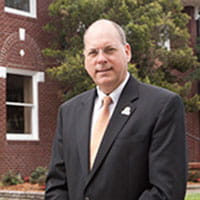Dr. Brucetta McClue Tate ’08 explains how Hurricane Katrina ultimately influenced her dissertation topic.

Dr. Brucetta McClue Tate.
DEGREE EARNED: PhD in Education with a specialization in Educational Technology
HOW LONG IT TOOK: Four years, part time, year-round
WHAT ELSE I WAS DOING AT THE TIME: I was writing grants and doing administrative work for St. Monica Catholic School in New Orleans and working as an adjunct faculty member for three institutions.
MY BIGGEST CHALLENGE: I was just beginning my dissertation when Hurricane Katrina hit my home in New Orleans. When we evacuated, I took three outfits, my laptop, insurance papers, transcripts, and research material. I knew I could study on the road. I went to a church in Kingwood, Texas, which provided assistance and clothing. In the same week, it held a job fair and I was interviewed by Lone Star College–Kingwood. The dean hired me on the spot. Walden provided a grant to displaced students, which helped me replace books I lost in the storm. I also received assistance for housing from FEMA, so I stayed in the Sheraton for nine months. In 2006, I came back to New Orleans to rebuild.
WHAT KEPT ME MOTIVATED: My faith, my family, my fiancé who is now my husband, and my committee members. Everyone at Walden was wonderful after the hurricane. My mentor called immediately. Other professors and students emailed and asked if they could help. The compassion of the Walden community and a lot of prayer got me through everything.
WHEN AND WHERE I STUDIED: Early mornings, after and between jobs, and on Saturdays and Sundays—in cafés, local college libraries, and, for nine months after Hurricane Katrina, in a hotel.
HOW THE HURRICANE INFLUENCED MY DISSERTATION: When I realized how devastating Katrina was, my dissertation research changed. My original topic was the positive effects of online instruction, but, after Katrina, I wanted to investigate how technology could impact the rebuilding and survival of Gulf Coast academic institutions.
HIGHEST POINTS: There have been so many! When I defended my research, walked across the stage at graduation, published articles—and a book—and saw my research help decision-makers across the nation. My committee members helped me transform my dissertation into a book, The Use of Instructional Technology in Dealing With Disasters: How Universities Used IT During Hurricane Katrina (Edwin Mellen Press, 2009). I realized my work had made a positive impact on my community when I was asked to speak at a number of conferences. I’m also writing books to help children understand technology concepts through humor.
MY NEXT BIG CHALLENGE: I’m starting a study to research how technology contributes to communication after hurricanes. It will look at Hurricane Isaac and Superstorm Sandy. I am also working on research with Dr. MaryFriend Shepard about professors’ perspectives on bullying face to face and online. It’s also my vision that my children’s books about technology will evolve into other learning tools and become a movie or cartoon series.
Tell us how you did it at [email protected].



